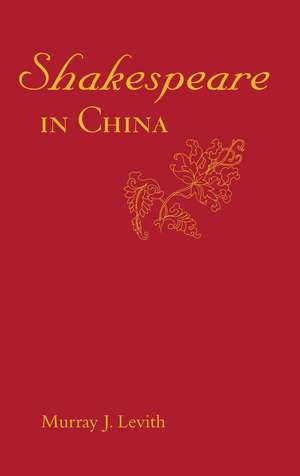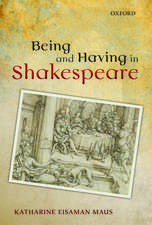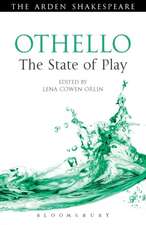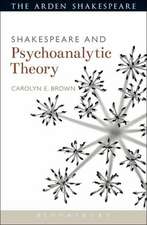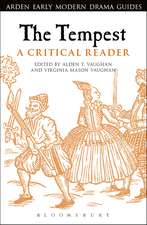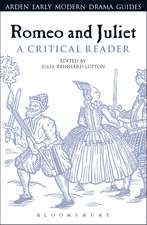Shakespeare in China
Autor Murray J. Levithen Limba Engleză Hardback – 30 apr 2004
Preț: 1062.63 lei
Preț vechi: 1365.25 lei
-22% Nou
Puncte Express: 1594
Preț estimativ în valută:
203.34€ • 212.83$ • 169.24£
203.34€ • 212.83$ • 169.24£
Carte tipărită la comandă
Livrare economică 31 martie-14 aprilie
Preluare comenzi: 021 569.72.76
Specificații
ISBN-13: 9780826461377
ISBN-10: 0826461379
Pagini: 176
Ilustrații: 11
Dimensiuni: 138 x 216 x 20 mm
Greutate: 0.33 kg
Ediția:New.
Editura: Bloomsbury Publishing
Colecția Continuum
Locul publicării:London, United Kingdom
ISBN-10: 0826461379
Pagini: 176
Ilustrații: 11
Dimensiuni: 138 x 216 x 20 mm
Greutate: 0.33 kg
Ediția:New.
Editura: Bloomsbury Publishing
Colecția Continuum
Locul publicării:London, United Kingdom
Caracteristici
Shakespeare is the most widely known foreign writer in China - his work is taught in schools and universities, performed on stage and a subject of much Chinese scholarship
Cuprins
Acknowledgements
Preface
1. The Early History of Shakespeare in China: Journey to the East
2. Shakespeare and Mao, 1 October 1949-1966: "I slide/O'er sixteen years"
3. The Great Proletariat Cultural Revolution: "a wilderness of tigers"
4. After the Cultural Revolution, 1976-2000: "A local habitation"
5. Shakespeare in Hong Kong and Taiwan: "This island's mine"
6. Shakespeare and Confucius: "To suck the sweets of sweet philosophy"
7. The Paradox of Shakespeare in the New China: "Fair is foul, and foul is fair"
Bibliography
Index
Preface
1. The Early History of Shakespeare in China: Journey to the East
2. Shakespeare and Mao, 1 October 1949-1966: "I slide/O'er sixteen years"
3. The Great Proletariat Cultural Revolution: "a wilderness of tigers"
4. After the Cultural Revolution, 1976-2000: "A local habitation"
5. Shakespeare in Hong Kong and Taiwan: "This island's mine"
6. Shakespeare and Confucius: "To suck the sweets of sweet philosophy"
7. The Paradox of Shakespeare in the New China: "Fair is foul, and foul is fair"
Bibliography
Index
Recenzii
"As a survey of Shakespeare in translation and performance in China during the last half of the 20th century, Levith's book serves as a worthy introduction. Shakespeare in China covers the important historical events since 1949 and their effects on circulation of western literary texts and ideas. It has some real value and serves as a model of genuine international scholarship and interdisciplinarity that will benefit scholars and teachers of Shakespeare." - The Shakespeare Yearbook, October 2005
"There are fascinating takes : The Merchant of Venice as a play about economic reform; and Othello with Iago representing the talented and capable unable to get ahead under the new economic order. The chapter on "Shakespeare and Confucius" is illuminating." - South China Morning Post, January 2007
"From their first encounters with Shakespeare early in the twentieth century, the Chinese have adapted Shakespeare to specific, although various, national needs. Whether they continue to use Shakespeare in this way, or at all, as they develop into a dominant world power remains an open question. Murray Levith's useful study, now available in paperback, enables us to probe this question from many different angles...Surveys of the kind that Levith offers are indispensable, given the State of scholarship in the field and the difficulties of access to materials, and he provides a valuable service in making a wealth of information available to international scholars...Inwardness, nationalism, Marxism-these seem to be the culprits for Levith. Identifying them helps to explain why the adaptations and appropriations of Hong Kong and Taiwan seem benign. Although a thorough discussion of these issues goes beyond his purposes, Levith does well to raise them: they are important for an understanding not only of Shakespeare's position in China but in the contemporary world community." - Edward Berry, University of Victoria, Modern Philology, November 2007
Mention -Bibliotheque d'Humanisme et Renaissance, Tome LXX-2008
'...is short, easy to read and infailingly engaging...recommend that readers find Shakespeare in China in their libraries, or if their libraries don't have copies, urge them to acquire it.'
"There are fascinating takes : The Merchant of Venice as a play about economic reform; and Othello with Iago representing the talented and capable unable to get ahead under the new economic order. The chapter on "Shakespeare and Confucius" is illuminating." - South China Morning Post, January 2007
"From their first encounters with Shakespeare early in the twentieth century, the Chinese have adapted Shakespeare to specific, although various, national needs. Whether they continue to use Shakespeare in this way, or at all, as they develop into a dominant world power remains an open question. Murray Levith's useful study, now available in paperback, enables us to probe this question from many different angles...Surveys of the kind that Levith offers are indispensable, given the State of scholarship in the field and the difficulties of access to materials, and he provides a valuable service in making a wealth of information available to international scholars...Inwardness, nationalism, Marxism-these seem to be the culprits for Levith. Identifying them helps to explain why the adaptations and appropriations of Hong Kong and Taiwan seem benign. Although a thorough discussion of these issues goes beyond his purposes, Levith does well to raise them: they are important for an understanding not only of Shakespeare's position in China but in the contemporary world community." - Edward Berry, University of Victoria, Modern Philology, November 2007
Mention -Bibliotheque d'Humanisme et Renaissance, Tome LXX-2008
'...is short, easy to read and infailingly engaging...recommend that readers find Shakespeare in China in their libraries, or if their libraries don't have copies, urge them to acquire it.'
